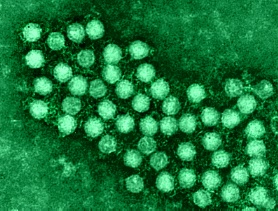An infant from Long Beach was diagnosed with Los Angeles County’s first case of Enterovirus D68 this week, a respiratory virus. The infant was treated at the pediatric intensive care unit at Miller Children’s Hospital in Long Beach.
 “No direct antiviral treatment was needed, what we do is offer supportive care. We help the body’s ability to fight the virus on its own, such as giving oxygen, breathing treatments that help open up the airway, as well as suctioning to clear the airway of secretions. Patients may require mechanical ventilation through intubation. This was not the case for this child,” Dr. David Michalik, DO, a pediatric infectious disease specialist at Miller Children’s hospital said about the child’s treatment.
“No direct antiviral treatment was needed, what we do is offer supportive care. We help the body’s ability to fight the virus on its own, such as giving oxygen, breathing treatments that help open up the airway, as well as suctioning to clear the airway of secretions. Patients may require mechanical ventilation through intubation. This was not the case for this child,” Dr. David Michalik, DO, a pediatric infectious disease specialist at Miller Children’s hospital said about the child’s treatment.
“The child has improved, was treated here for just under a week and was sent home,” Michalik told the Post.
First identified in California in 1962, Enterovirus D68 is one of over 100 non-polio enteroviruses, according to the CDC. The virus can spread from an infected person’s respiratory secretions, such as saliva, nasal mucus or sputum. EV-D68 likely spreads from person to person if an infected person coughs, sneezes or touches contaminated surfaces.
From mid-August to October 1, the CDC has confirmed 500 people in 42 states and D.C. with respiratory illness due to EV-D68.
Infants, children and teenagers, who have yet to develop the immunity from previous exposures to these viruses, according to the CDC, can become infected, while children with asthma may have a higher risk for severe respiratory illness caused by EV-D68.
Michalik explained, “Patients with the virus, or symptoms of the virus can typically be monitored by a general pediatrician that works here in the hospital without having the specialist get involved, but when things do get more severe or questions are needed to be answered we can get involved in that case.”
According to Michalik, a worst case scenario would require hospitalization and admission to the intensive care unit. He said, “A patient can go into respiratory failure, the potential to succumb to this illness is there.”
Miller Children’s hospital cannot test for the virus themselves, but must wait for the state of California to send back results. Michalik said, “The testing that gets done by the state of California takes about two weeks to get back, so even if I have somebody suspected of having the virus, I have to wait for the result from the state. We don’t have the ability to test for the serotype.”
On whether we can expect to see more cases of EV-D68 this viral season, Michalik said, “We can expect these numbers to rise [in] the upcoming weeks.”
On the symptoms of EV-D68, Michalik explained, “The symptoms are typical of a common cold for many cases, having a runny nose, persistent coughing. What makes this virus special or unique is that it can lead to more severe respiratory symptoms, such as wheezing, difficulty breathing, chest retractions, fever, it can be difficult to distinguish this virus from other viral infections.”
“This virus is primarily spread through contact of infected surfaces and infected individuals, objects with frequent human contact. If there’s any message to be conveyed it’s that good hand hygiene and handwashing are the best tools that we have,” Michalik said.
To protect yourself and your child from the virus, the CDC recommends that you:
- Wash your hands with soap and water for 20 seconds.
- Avoid touching your eyes, nose and mouth with unwashed hands.
- Avoid kissing, hugging and sharing cups or utensils with people who are sick.
- Disinfect frequently used surfaces, such as toys, doorknobs and counters, especially if someone in the household is sick.

